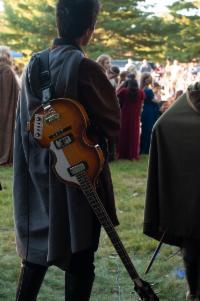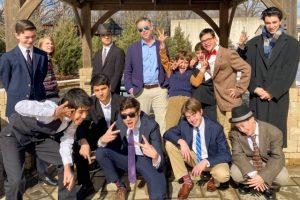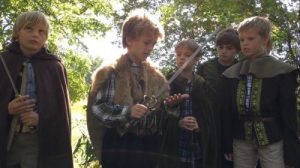
By Monta Hernon
By this point, I’m guessing you all are aware that the summer musical is an original (the 10th) written by Riverside Director Peter Searby.
Having known Peter for many years, I have learned enough of his creative process to become somewhat envious of it. A few months out he decides he is going to pen a script about the Beatles and East Berlin. Then suddenly, he changes to an homage to Kung Fu. He buys ancient Chinese instruments and asks me to help him research the history of the Shaolin temple.
And this all leads him to…Peter Pan.
Yes, this is testimony to the fickleness of the creative mind. But when a spark of inspiration appears, there is an absolute need to follow it down a proverbial rabbit hole until a cast of characters emerges fully formed, complete with a backstory and score of music. The overall trip is not for the faint of heart; it involves full immersion sometimes to the detriment of everyday life and to the frustration of those expecting attention to be paid to the world outside of, in this case, Neverland.
The basic story idea for The Lost Boy has been percolating for a while, but the timing wasn’t right and perhaps Peter wasn’t ready for this particular journey. Last summer and even this spring, for example, it was eclipsed by reboots of I Am Jimmy Wremble and the Princess and the Pirate.
It turns out that the delay was fortuitous. We discovered that Peter Pan just came into the public domain in 2024. But, in my opinion, it also is fitting that The Lost Boy is Peter’s 10th, an important, anniversary-type number. To me, it feels right that this story coincides with the high school graduation year of the boys who were 8-year-olds in the very first Tutorial class in the fall of 2014.
Why? Because there are so many parallels between the story arc of The Lost Boy and the driving force behind the Riverside Tutorial. I have been privileged to read/edit the script before its release and do not wish to give too much away. (I do hope that you will come and see the musical performed at Wheaton Academy, August 1-3, and will let me know if you agree with my opinions or feel that what I’m about to say is nonsensical.)
We all know the original story of Peter Pan, the boy who never grows up, and his adventures in Neverland with Wendy and her brothers. The Lost Boy is set two generations later. Wendy’s granddaughter, Angela, now inhabits the famous bedroom, knows the tales of Neverland, and desperately wants to meet Peter and travel there herself. Peter never comes; he is truly lost and trapped in a world tarnished by a great war. We learn that Peter remembers nothing; his amnesia was brought about by the betrayal of his best friend who had committed the biggest sin: he had begun to grow up.
 You see, once a boy turns thirteen, Peter kicks him out of the Lost Boys, no ifs, ands, or buts. Many of these boys feel betrayed and do not see an alternative path to manhood other than becoming a pirate. This was the case for Vaughn, who once was Peter’s best friend. The question becomes whether it is possible for Peter Pan to be the prince of boyhood and guide to the imagination while at the same time preparing the boys in his care to become honorable men.
You see, once a boy turns thirteen, Peter kicks him out of the Lost Boys, no ifs, ands, or buts. Many of these boys feel betrayed and do not see an alternative path to manhood other than becoming a pirate. This was the case for Vaughn, who once was Peter’s best friend. The question becomes whether it is possible for Peter Pan to be the prince of boyhood and guide to the imagination while at the same time preparing the boys in his care to become honorable men.
The Riverside Tutorial is all about fostering the imagination and giving boys a place to embrace boyhood for all its worth. It is a veritable Neverland, albeit for one day a week in suburban Lemont. The boys age out at 13-14 because that is the inevitable time of growing up, of seeking more autonomy, of questioning authority. They become Journeymen.
However, unlike the Lost Boys who feel abandoned by Peter Pan in the musical, the Riverside Tutorial gives apprentices many tools to guide them as they grow up. One of the most important, I think, is confidence. This plays out in remaining true to who they are, but also in having a willingness to step outside of their comfort zone. The Riverside Code is a foundation for many principles of life, including how to treat others and the importance of working hard and with purpose.
having a willingness to step outside of their comfort zone. The Riverside Code is a foundation for many principles of life, including how to treat others and the importance of working hard and with purpose.
One of the tenets of the Code, See Beyond, introduces the concept of the sacramental imagination, which helps us to look past the ordinary to find the extraordinary; perceiving our experiences in a way that leads us closer to the truth. By fostering the imagination, the Riverside Tutorial helps boys gain an inkling of their creative gift and calling and helps them understand their role in building the Kingdom here on Earth.

Artwork by Cash York
Many people over the years have questioned whether Riverside could expand and offer programming for older boys. More formal offerings might be in the making especially if and when Riverside one day gets its own property. Peter has some ideas about the need for coming of age rituals (see the next article in this issue, based on a chapter in his book) and how Riverside can be a conduit.
In the meantime, I’d say that the Journeymen who have been interested in staying involved with Riverside have found opportunities. Those with musical interests are asked to come and play at Riverside events. Journeymen artists produce amazing images for Riverside events and books and young adults with an inclination to work with kids serve as camp counselors. There also is the Threshold retreat, which, while postponed from this summer, will be offered again soon. And, the age range for summer theatre is 8-19, allowing journeymen and women to return to the Riverside stage.
So in August, I hope you will come and see for yourself how Peter Pan comes to terms with his losses and realizes his own mistakes (Tickets). Let Tinkerbell sprinkle you with pixie dust and fly you to a magical Neverland with fairies, mermaids, and the seemingly indomitable Captain Hook.




 You see, once a boy turns thirteen, Peter kicks him out of the Lost Boys, no ifs, ands, or buts. Many of these boys feel betrayed and do not see an alternative path to manhood other than becoming a pirate. This was the case for Vaughn, who once was Peter’s best friend. The question becomes whether it is possible for Peter Pan to be the prince of boyhood and guide to the imagination while at the same time preparing the boys in his care to become honorable men.
You see, once a boy turns thirteen, Peter kicks him out of the Lost Boys, no ifs, ands, or buts. Many of these boys feel betrayed and do not see an alternative path to manhood other than becoming a pirate. This was the case for Vaughn, who once was Peter’s best friend. The question becomes whether it is possible for Peter Pan to be the prince of boyhood and guide to the imagination while at the same time preparing the boys in his care to become honorable men.  having a willingness to step outside of their comfort zone. The Riverside Code is a foundation for many principles of life, including how to treat others and the importance of working hard and with purpose.
having a willingness to step outside of their comfort zone. The Riverside Code is a foundation for many principles of life, including how to treat others and the importance of working hard and with purpose.